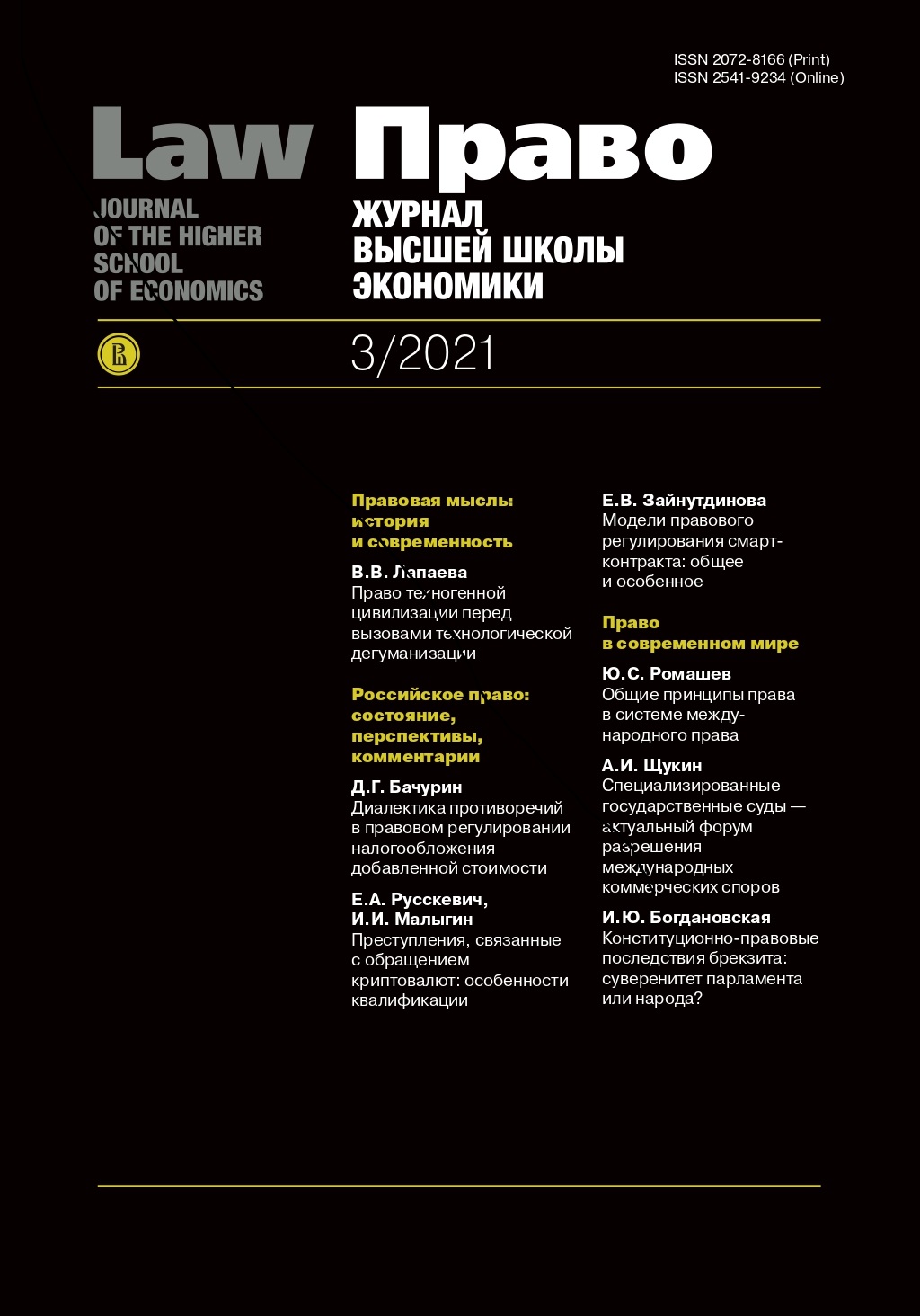Models of Legal Regulation of Smart Contract: Generalities and Specifics
Abstract
The smart contract' term and its peculiarities are already regulated by different legal systems. Author distinguishes and analyzes the following models of legal regulation of a smart contract: technically oriented (smart contract as a computer program); deal-oriented (smart contract as a legally binding contract or provision of a contract); combined model (smart contract simultaneously as a computer program and as a contract). Acts on smart contracts are enacted on national or subnational level in the form of amendments to existing laws on contracts, e-commerce, information technologies or in a separate legal bill (act) regulating also such issues as application of blockchain (distributed ledger) technology, issue and turnover of tokens and cryptocurrency. In case of use of technically oriented model such legal issues as conclusion and interpretation of a smart contract, its invalidation, amendment and termination, application of means of defence and responsibility, choice of applicable law to a smart contract and competent authority that is to settle a dispute arising out of a smart contract, remain unresolved. Deal-oriented and combined models (even with pitfalls of combined model due to confusion between smart contract as a computer program and as a contract) are more preferred since these models define peculiarities of conclusions and performance of smart contracts in contract law for its practical use. Besides this, definition of automated performance of obligations that is inherent to a smart contract as a contract (contract type) in the form of a program code concluded and performed in special information system (decentralised distributed ledger) is to be reflected. Overall trends of legal regulation of a smart contract are the use of special technical terms (such as blockchain, token, cryptocurrency) that are firmly established in practice, statements on smart contract conclusion and performance (even if a smart contract is defined as a computer program), and creating non-discriminatory legal basis for the use of smart contracts along with contracts in written form and other means of proof.
References
Belykh V.S., Bolobonova M.O. (2019) The issues of the legal regulation of smart contracts in Russia. In: Legal regulation of the economic relations in the modern digital economics. V.A. Vaipan (ed.). Moscow: Yustitsinform, 376 p. (in Russian)
Efimova L.G., Mikheeva I.E., Tchub D.B. (2020) Comparative analysis of doctrinal conceptions of smart contract legal regulation in Russia and abroad. Pravo. Zhurnal Vysshey shkoly ekonomiki, no 4, pp. 78-105 (in Russian)
Fairfield J. (2014) Smart Contracts, Bitcoin Bots, and Consumer Protection. Washington and Lee Law Review Online, issue 2, pp. 35-50.
Fedorov D.V. (2018) Tokens, cryptocurrency and smart contracts in Russian laws in terms of foreign experience. Vestnik grazhdanskogo prava, no 2, pp. 30-74 (in Russian)
Grin' E.S., Grin' O.S., Solovyev A.V. (2019) Legal design of smart contracts: legal nature and application. Lex Russica, no 8, pp. 51-62 (in Russian)
Krysenkova N.B. (2019) Smart contracts in foreign legal space. Mezhdunarodnoe publichnoe I chastnoe pravo, no 5, pp. 28-30 (in Russian)
Künnapas K. (2016) From Bitcoin to Smart Contracts: Legal Revolution or Evolution from the Perspective of de lege ferenda? The Future of Law and e-Technologies. Bern: Springer International, 233 p.
Lauslahti K., Mattila J., Seppälä T. (2017) Smart contracts: how will blockchain technology affect contractual practices. Institute of Finnish Economy. ETLA Reports, no 68, 27 p.
Makarova O.A., Makarov A.D. (2021) Conditions and perspectives of digital law. Aktual'nye problemy ekonomiki i prava, no 1, pp. 5-14 (in Russian)
Seval'nyov V. V., Trutsevsky Yu. V. (2020) Smart contract: from defining to definiteness. Pravo. Zhurnal vysshey shkoly ekonomiki, no 1, pp. 118-147 (in Russian)
Shaydolina V. K. (2019) Smart contracts in the financial market. Sudya, no 2, pp. 21-23 (in Russian)
Siedler N. (2016) The Legal Magnitude of Blockchain. Bucerius Executive Education. Available at: http://www.bucerius-education.de/artikel/the-legal-magnitude-of-blockchain/ (accessed: 10 June 2021)
Szczerbowski J. (2017) Place of Smart Contracts in Civil Law. A Few Comments on Form and Interpretation. Proceedings of the 12th Annual International Conference ‘New Trends'. Znoimo: Private College of Economic Studies, pp. 333-338.
Tchursuina T.I. (2020) Regulating blockchain and smart contracts in Malaysia. Mezhdunarodnoe publichnoe i chastnoe parvo, no 6, pp. 42-46 (in Russian)
Tyul'kanov A.L. (2017) Yes to blockchain, no to smart contracts. Zakon.ru (in Russian)
Volos A.A. (2020) Conflict of law regulation of relation in smart contracts. International public and private law, no 3, pp. 24-27 (in Russian)
Copyright (c) 2021 Law Journal of the Higher School of Economics

This work is licensed under a Creative Commons Attribution-ShareAlike 4.0 International License.


















